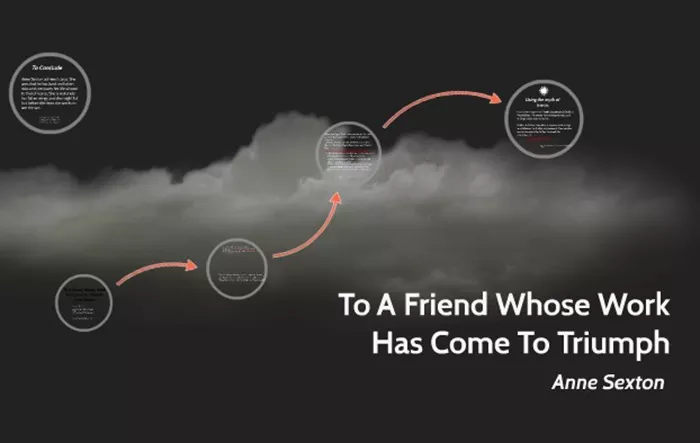Welcome to Poem of the Day – To a Friend Whose Work Has Come to Triumph by Anne Sexton
Anne Sexton was a powerful voice in American poetry. Known for her confessional style, she often explored personal struggles and emotional truths. Yet, in To a Friend Whose Work Has Come to Triumph, Sexton steps away from her usual themes of pain and darkness. Instead, she celebrates courage, ambition, and success.
This short but meaningful poem was written in 1962. It is a tribute to Sexton’s friend, fellow poet W.D. Snodgrass. The poem is also a reflection on the myth of Icarus. By blending myth and modern life, Sexton creates a timeless message. Let’s explore the poem in detail.
To a Friend Whose Work Has Come to Triumph Poem
Consider Icarus, pasting those sticky wintgs on,
testing that strange little tug at his shoulder blade,
and think of that first flawless moment over the lawn
of the labyrinth. Think of the difference it made!
There below are the trees, as awkward as camels;
and here are the shocked starlings pumping past
and think of innocent Icarus who is doing quite well:
larger than a sail, over the fog and the blast
of the plushy ocean, he goes. Admire his wings!
Feel the fire at his neck and see how casually
he glances up and is caught, wondrously tunneling
into that hot eye. Who cares that feel back to the sea?
See him acclaiming the sun and come plunging down
while his sensible daddy goes straight into town.
To a Friend Whose Work Has Come to Triumph Explanation
The Myth Behind the Poem
To understand this poem, we must first understand the myth of Icarus. In Greek mythology, Icarus is the son of Daedalus. They try to escape from Crete using wings made of feathers and wax. Daedalus warns Icarus not to fly too close to the sun. But Icarus is excited. He flies too high. The sun melts the wax, and he falls into the sea.
Most versions of the myth see Icarus as foolish. He disobeys his father and dies because of pride. But Sexton offers a new view. She praises Icarus for daring to fly. She sees his flight as a bold choice, not a mistake.
Celebrating Risk and Triumph
In the opening line, Sexton writes:
“Consider Icarus, pasting those sticky wings on,”
Right away, she invites us to “consider” Icarus in a new way. She does not scold him. Instead, she shows him in action, carefully building his wings. The word “sticky” makes the image feel real and human. Icarus is not just a myth. He is a person, full of dreams and effort.
Sexton continues:
“gluing those little feathers on, / testing that strange little tug at his shoulder blade,”
These lines focus on the details of his work. The process is fragile, delicate, and full of feeling. This is not a grand hero. This is a young man trying something new, feeling hope in his body. The “strange little tug” shows both excitement and nervousness.
Then Sexton makes a strong shift:
“and think of that first flawless moment over the lawn of the labyrinth.”
This is the heart of the poem. Sexton wants us to focus on the moment of flight. She calls it “flawless.” The maze below becomes a symbol of life’s confusion and traps. Rising above it means freedom and success. Icarus escapes not just the maze, but fear itself.
A New View of Icarus
Most people focus on Icarus’s fall. Sexton does the opposite. She writes:
“Think of the difference it made!”
This line is short but powerful. It’s a call to change our perspective. Yes, Icarus fell. But before that, he flew. That one moment mattered. It was beautiful. It was worth the risk.
Sexton praises those who dare to try, even if they might fail. She says:
“There below him, / his father…was as old as he had ever been.”
This contrast is striking. While Daedalus stays safe, he also stays still. Icarus, full of youth and daring, becomes greater than his father for that moment. Sexton is not disrespecting Daedalus. But she is lifting up those who choose action, even at a cost.
A Tribute to a Friend
The poem is also personal. It celebrates the work of a friend whose poetry has gained success. Sexton may be speaking to Snodgrass, but she also speaks to all artists and dreamers. She honors the courage it takes to create, to take risks, and to hope for flight.
Conclusion
To a Friend Whose Work Has Come to Triumph is a poem about bravery. It tells us that trying and risking is noble, even if the result is not perfect. Sexton wants us to celebrate effort, not just outcomes.
By retelling the myth of Icarus in a new light, she challenges old ideas about failure. She reminds us that sometimes, the moment of rising is more important than the fall. In today’s world, full of fear and pressure, Sexton’s message is fresh and inspiring.
This poem invites us all to believe in our own wings. It dares us to fly.

